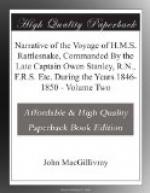It seems curious to find at Cape York and the Prince of Wales Islands a recognised division and ownership of land, seeing that none of it by cultivation has been rendered fit for the permanent support of man. According to Giaom, there are laws regulating the ownership of every inch of ground on Muralug and the neighbouring possessions of the Kowraregas, and I am led to believe such is likewise the case at Cape York. Among these laws are the following: A person has a claim upon the ground where both himself and his parents were born, although situated in different localities. On the death of parents their land is divided among the children, when both sexes share alike, with this exception, that the youngest of the family receives the largest share. Marriage does not affect the permanency of the right of a woman to any landed property which may have come into her possession. Lastly, an old man occasionally so disposes of his property that a favourite child may obtain a larger proportion than he could afterwards claim as his inheritance.
Neither at Cape York, nor in any of the Islands of Torres Strait, so far as I am aware, do the aborigines appear to have formed an idea of the existence of a Supreme Being; the absence of this belief may appear questionable, but my informant, Giaom, spoke quite decidedly on this point, having frequently made it the subject of conversation with the Kowrarega blacks.
Transmigration of souls.
The singular belief in the transmigration of souls, which is general among the whole of the Australian tribes, so far as known, also extends to the islands of Torres Strait. The people holding it imagine that, immediately after death, they are changed into white people or Europeans, and as such pass the second and final period of their existence; nor is it any part of this creed that future rewards and punishments are awarded. It may readily be imagined that when ignorant and superstitious savage tribes, such as those under consideration, were first visited by Europeans, it was natural for them to look with wonder upon beings so strangely different from themselves, and so infinitely superior in the powers conferred by civilisation, and to associate so much that was wonderful with the idea of supernatural agency. At Darnley Island, the Prince of Wales Islands, and Cape York, the word used at each place to signify a white man, also means a ghost.* The Cape York people even went so far as to recognise in several of our officers and others in the ship, the ghosts of departed friends to whom they might have borne some fancied resemblance, and, in consequence, under the new names of Tamu, Tarka, etc. they were claimed as relations, and entitled to all the privileges of such.
(Footnote. Frequently when the children were teasing Giaom, they would be gravely reproved by some elderly person telling them to leave her, as “poor thing! she is nothing, only a ghost!” (igur! uri longa, mata markai.))




